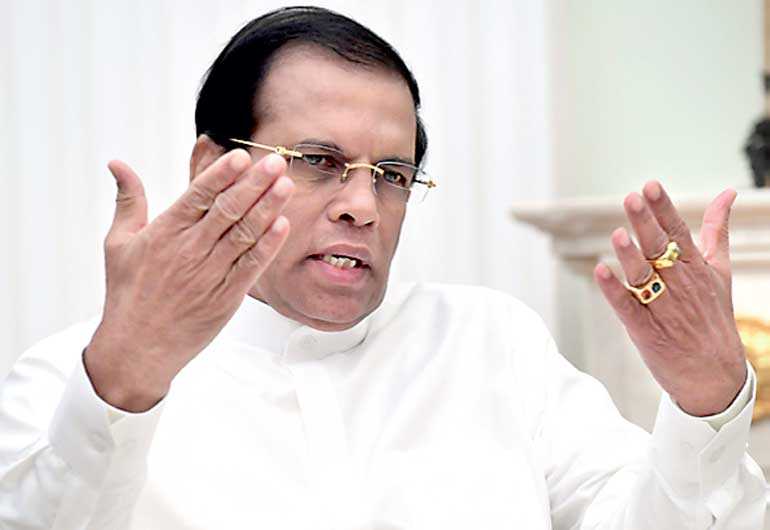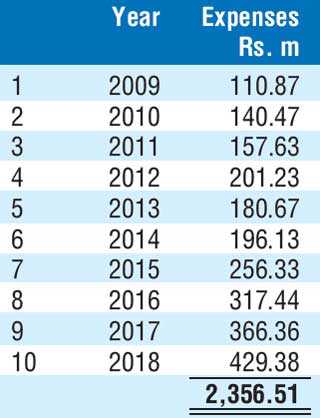Wednesday Feb 18, 2026
Wednesday Feb 18, 2026
Monday, 18 March 2019 00:00 - - {{hitsCtrl.values.hits}}

Good governance activist Chandra Jayaratne has written to President Maithripala Sirisena issuing a note of caution of historical outcomes prior to the launch of the National Action Plan for Combating Bribery and Corruption today at a ceremony titled ‘Warrant of Integrity: The Launch of the National Action Plan for Combating Bribery and Corruption’ at Shangri-La Hotel.
Following are excerpts of the letter to the President with copies to Secretary to the President Director General, CIABOC and shared with media:
I believe it is my duty as citizen activist committed to and championing transparency and good governance, to sound a note of caution, in bringing to your notice and awareness, the duly reported historical outcomes of achievement of the Bribery and Corruption Commission over the last 10 years. I am at this stage unaware, whether the National Action Plan to be launched will highlight the information to be shared with you in this letter.
I believe this information, obtained directly from the Bribery and Corruption Commission, by filing a Right to Information request, will permit you to review the National Action Plan for Combating Bribery and Corruption, being aware of the correct background perspectives. I also believe that the information herein provided will enable you, to raise strategic questions and evaluate their responses from a position of being better informed of the historical achievements.
The key Right to Information questions and their responses are detailed below:
1. The total number of cases filed in courts of law by CIABOC, during the last 10 years, in connection with allegations of
a. Bribery in Sri Lanka or in foreign countries, where the alleged bribe(s) was/were in excess of Rs. 10 million, in each such filed case? Response: One Case – Case Number HCB/32/2017
b. Corruption, where the value of the alleged act of corruption was in excess of Rs. 25 million, in each such filed case? Response: Nil
2. Total number of cases, out of each category referred to above, which have been concluded by December 2018, with resultant convictions of the offenders? Response: Nil
3. Total value of fines imposed and/or assets confiscated/recovered, by December 2018, consequent to case decisions in each of the categories referred to above? Response: Nil
4. Total number of cases out of each of the categories referred to, which have been dismissed or withdrawn? Response: Nil
5. The total costs expended in the maintenance of CIABOC as an institution over the period of 10 years ending in December 2018? Response:
I believe, a strategic review of the National Action Plan, should begin with a critical assessment of why the aforesaid dismal outcomes were the results over the last 10 years of operation of the Bribery and Corruption Commission. And thereafter the review should proceed to critically assess the inherent drivers leading to these outcomes and finally to a cost benefit analysis. Further, it will be essential to ask strategic questions to determine as to whether these dismal outcomes were the results of the:
1. Lack of ‘Political Will’ of those in the highest echelons of governance in Sri Lanka in the last 10 years?
2. Lack of a deep sense of commitment of purpose and effective leadership qualities with requisite capabilities of those in charge of the Commission?
3. Failure to motivate the staff to seek excellence in outcomes, in pursuing national goals of minimisation of large scale bribery and corruption?
4. Lack of capable (knowledge, skills attitudes and values) human resources? Especially in the areas of intelligence gathering, detections, investigation, analysis, network links to enhance capacity, and effective prosecution and deterrent punishments, along with essential ‘naming and shaming’?
5. Inadequate financial and infrastructure resource support especially ICT leveraging options?
6. Lack of effective and committed management and implementation processes?
7. Lack of effective systems, procedures, data bases and information links?
8. Lack of intelligence, pooling of intelligence available within law enforcement agencies and lack of joint investigations with effective co-ordination mechanisms to collectively bind the agencies to the realisation of justice and national goals?
9. Lack of an effective strategic plan with collective leadership and network facilitation?
10. Restrictions in the legal framework and structural weaknesses of the institution, especially the very restrictive secrecy provisions and outdated legal provisions?
11. Ineffective communications and lack of public support and low institutional public image?
12. Low stakeholder and citizen support, misaligned inherent societal norms and lack of citizen commitment to realise the impact on them by offenses of bribery and corruption?
 And thereafter strategically assess what hurdles, restrictions or external or internal limitations prevented the overcoming challenges and moving ahead to achieve the goals articulated by national and societal leaders and commitments publicly announced by them, in line with public expectations.
And thereafter strategically assess what hurdles, restrictions or external or internal limitations prevented the overcoming challenges and moving ahead to achieve the goals articulated by national and societal leaders and commitments publicly announced by them, in line with public expectations.
I trust that in the interests of making a success of realising the goals and objectives of the National Action Plan to be launched next Monday, you will endorse that this letter to you, should be publicly released; and a national debate and awareness around the findings and issues noted herein be concurrently launched; along with an executive commitment to support the launch with a well-designed public communications campaign.
It is reiterated that above all, the success of the National Action Plan will be entirely dependent on the Role Model Leadership commitment publicly demonstrated by living examples set by the national and societal leaders, without exception and with consistency. They must in addition, lead the nation and the common citizens to an attitudinal change of abhorring bribery and corruption and publicly challenging and naming and shaming those who engage in such unacceptable practices.